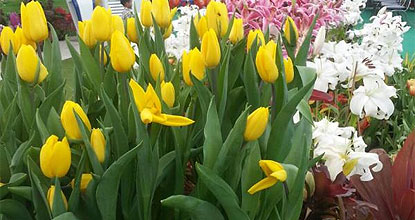
RAYONG - After three years of research, PTT Plc has successfully cultivated selected cool-season crops using cool waste from the regasification process at its liquefied natural gas (LNG) receiving terminal in Rayong, helping to add value to the country’s farm sector.

PTT exhibits tulips and other cool-season crops grown using cool waste from the regasification process at its LNG receiving terminal in Rayong. The one-week event earlier this month attracted over 10,000 visitors.
The research, conducted with Chiang Mai University, the Office of the Royal Project Board and King Mongkut University of Technology Thon Buri, found that tulips and lilies are the most appropriate cool-season crops using this method.
Selected tulip varieties are Strong Gold, Kung Fu and Purple Flag, while the lily varieties comprise Tiber, Red Latin, Menorca and Cherbourg.
Chawalit Boonbumrungchai, PTT’s manager of turnaround management, said Thailand is the first tropical country to use cool waste from LNG, as most users of the gas are in cooler areas such as Japan, South Korea and Europe.
“Similar to England, these countries could shift cool waste into warm air, but we chose cool air for agri-business because a number of Thai businesses are involved in this field,” he said.
Lilies and tulips grown by PTT have been sold to local flower shops in Rayong. From April 3-9, PTT exhibited the results of its cool waste management project to the public near Map Ta Phut to raise public awareness of the system.
PTT imported 1.4 million tonnes of LNG last year and expects to increase that to 2 million tonnes this year and 5 million after 2018. Some 2 million tonnes of LNG produces cool waste equivalent to 6,000 air conditioners.
“This took a series of trial and error for many years before we knew how to grow flowers and strawberries,” said Mr Chawalit, adding the experiment would be expanded to year-round production.
Sirichai Buravannint, PTT’s executive vice-president of natural gas processes, said last year experiments used 80 strains of strawberries from the royal project. This year PTT plans to use Japanese strawberries.
PTT and its partners are ready to offer technical support for growing cool-season crops such as flowers and strawberries as part of its corporate social responsibility programme.
Mr Sirichai said the next research step is to produce a mobile cool energy storage unit, which is similar to a smartphone power bank but is used for cooling.
Last year, the company built its first van-size cool power bank that provides 20C cooling continuously for five days. The cool power bank uses 25% less energy than a cooling unit powered by electricity.
“We are developing a smaller, longer-lasting cool power bank and expect the first prototype to be finished within this year,” said Mr Chawalit.
Researchers are close to finding an appropriate phase change material or cool vehicle material, he said. A patent for cool storage management will also be registered.
Shares of PTT closed Friday on the Stock Exchange of Thailand at 311 baht, down one baht, in trade worth 501 million baht.